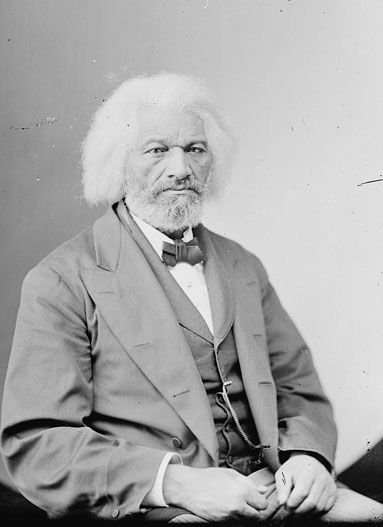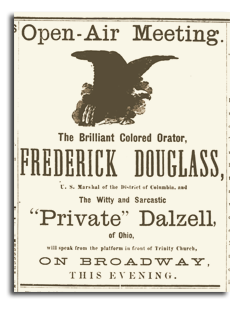The Garfield Guards will escort the
speakers to the stand on Broadway to-night, where the speaking will
be. - - In this connection we shall mention the fact that there is a
difference between a popular torchlight procession and a uniformed
escort. The Guards will receive the most of our speakers
without calling upon other citizens to turn out in procession.
When we desire to make a popular demonstration torches will blaze
over about a thousand voters in line."
Garfield Guards, Attention, Battalion!
Headquarters, First Battalion
Garfield Guards,
Sept. 10, 1880.
General Order No. 3:
All uniformed officers and men of the Garfield Guards will assemble
this (FRIDAY) evening, for escort duty. Companies will
assemble at the same time and places designated in General Order No.
2.
Battalion will form line on Broadway at 7:15 sharp, right resting on
Main Cross street.
W.S. McClure
Colonel Commanding
W.A. Quigley, Adjutant
Frederick Douglass was sumptuously
entertained by Walter last night after the speaking at the Court
House. Walter gave the old man a splendid spread.
The stampede for the Court House last night, after Fred. Douglass
decided to go there to speak, was an animating scene. The
throng rushed up Main Cross like a wave on the living sea, and the
Court House was packed and jammed with people eager to hear the
speech.
When the Garfield Guards turn out and parade the streets like
civilized citizens it is crushing to them to have women, boys and
girls, tearing their windpipes for Han -n- -n- cock. If those
who do the yelling only know how awful it made the Guards feel they
would button their lips.
Mr. Fred. Douglass and Mr. Fred. Harper had a very pleasant
conversation yesterday, growing out of the fact that when Mr. D.
escaped from slavery he belonged to Captain Thomas Auld, of St.
Michael's Talbot county, Maryland, who married an aunt of Mr.
Harper's. They had quite a talk about the past, and Mr.
Douglass expressed himself pleased with the interview, as he liked
to meet with persons who are acquainted with his origin and
history. Mr. Harper reminded Mr. Douglass that his old master
used to say that he (Mr. D.) exhibited remarkable mental brightness
and activity from early youth, but was physically lazy. Mr.
Douglass laughed and said it was a fact, but added that but very few
persons labored physically more than they were compelled. Mr.
Douglass is now sixty-five years old. Captain Auld died a few
months ago in St. Michael's at the residence of John C. Harper, aged
eighty-four years.
Another Grand Rally!
An Outpouring of All Kinds of People,
To See the Parade and Hear Dalzell and Douglass
At the appointed hour last evening the Garfield Guards rallied, and
the Battalion formed on Broadway. The parade was made upon
Main Cross between Walnut street and the railroad bridge, and the
Guards attracted the populace by their fine marching in their
uniforms, with lamps trimmed and brightly burning. The
Battalion broke ranks on Broadway and joined the multitude of people
who surrounded the speakers' stand near Trinity Church. The
stand was decorated with flags and illuminated with Chinese
lanterns, and as the crowd assembled rockets, Roman candles, and red
and green lights pierced the darkness with their brilliancy.
Hon. Frederick Douglass was so fatigued, and the open air had so
affected his voice, that he did not attempt to speak at the
stand. Hon. J. M. Dalzell was introduced by Mr. M. C. Garber,
Jr., and made a brief but earnest and telling speech. There
was not an old soldier present who heard "Private" Dalzell but felt
the force of his appeal to them for the points he made were
supported by events of the war and attitude of the two parties since
the boys in blue came back to peaceful homes.
Mr. Frank Anderson introduced Hon. Frederick Douglass, who excused
himself from speaking in the open air, and invited those who desired
to hear him to repair to the Court House. It is needless to
state that the auditorium was soon filled to its capacity. The
venerable hero was greeted with enthusiastic cheers on his
appearance, and during his speech, for his voice came to him and he
spoke with his wonted power. To every man who has not become
blinded by prejudice, the appearance of Mr. Douglass is
impressive. He has arisen from a condition of servitude in
early life to the altitude occupied by the foremost statesmen and
orators of the country, and as the representative of a people who
toiled under the lash of a Southern Democracy he stands before the
world - - self-educated, intelligent, eminent - - as proof that his
race were worthy of the freedom given it by the Republican
party. His speech last night was a powerful one. It
contained so many convincing, logical points that any attempt to
synopsize it would be futile with our limited space.
We congratulate the Republicans on the success of last night's
demonstration, and look forward to other victories. Let the
good work move on till it assumes the gigantic proportions and the
irresistible force of a tidal wave!
"A Number of Youths," Madison
Evening Courier, 11 Sept. 1880, 4.
A number of youths have organized in the East End under the name of
Garfield Juveniles. They have elected Johnnie Wood, Captain,
and Charlie Rea, Lieutenant, and have written to a firm in
Cincinnati in regard to procuring uniforms. Suffer the boys to
come unto us, for of such shall the country be saved in the future.
The Garfield Cadets composed of young Republicans of Madison, made a
fine display on the reception of Hon. Fred. Douglass and Private
Dalzell last night. Their uniforms are neat and show to good
advantage. They march with the regularity of veterans, which
proves that officers and men take a pride in being well drilled and
orderly and they deserve credit for their manly bearing."
"Republican Rally at
Madison," Cincinnati Enquirer, 11 Sept. 1880, 2.
Special Dispatch to the Enquirer
Madison Ind., September 10. The Republicans to-night held
an open-air meeting on Broadway. Speeches were delivered
by Hon. Frederick Douglass and Hon. J. M. Dalzell, of
Ohio. The speakers were escorted to the place of meeting
by a battalion of uniformed Garfield Guards, making a very
creditable display. The meeting was a very large one,
composed of both Democrats and Republicans.
 When Douglass spoke at other Indiana towns, his
experiences were similar. In Indianapolis, the "immense
crowd" was too big for the original location, and latecomers had
to be satisfied with an "auxilliary meeting" nearby. In
Lafayette, he drew the biggest crowd of the year, and his speech
"incited a great deal of enthusiasm." Although he appeared
as part of a political event, "a large number of those present
were prompted to attend out of mere curiosity." Douglass's
address in Pendleton was especially memorable because of his
experiences there as a young man. "On the platform were
seated several Indianians who had seen Douglass mobbed and left
for dead on that very spot thirty-seven years ago. . . .
As Mr. Douglass referred eloquently to those events of far-off
days his audience pressed forward, unwilling to lose a word, and
there was scarcely a dry eye in the crowd. What a change
in less than a half century!"
When Douglass spoke at other Indiana towns, his
experiences were similar. In Indianapolis, the "immense
crowd" was too big for the original location, and latecomers had
to be satisfied with an "auxilliary meeting" nearby. In
Lafayette, he drew the biggest crowd of the year, and his speech
"incited a great deal of enthusiasm." Although he appeared
as part of a political event, "a large number of those present
were prompted to attend out of mere curiosity." Douglass's
address in Pendleton was especially memorable because of his
experiences there as a young man. "On the platform were
seated several Indianians who had seen Douglass mobbed and left
for dead on that very spot thirty-seven years ago. . . .
As Mr. Douglass referred eloquently to those events of far-off
days his audience pressed forward, unwilling to lose a word, and
there was scarcely a dry eye in the crowd. What a change
in less than a half century!"
Sources: "Republican Demonstration at
Indianapolis,"
St. Paul (Minnesota)
Globe, 5
Sept. 1880, 1; "Fred Douglass at Lafayette,"
Chicago Daily
Tribune, 13 Sept. 1880, 1; "Douglass at Lafayette,"
Cincinnati Enquirer, 13 Sept. 1880, 2; "Incident of the
Indiana Campaign [in Pendleton],"
Harrisburg
(Pennsylvania)
Telegraph, 10 Sept. 1880, 1.

Frederick Douglass, c. 1875 (from the Library
of Congress).













